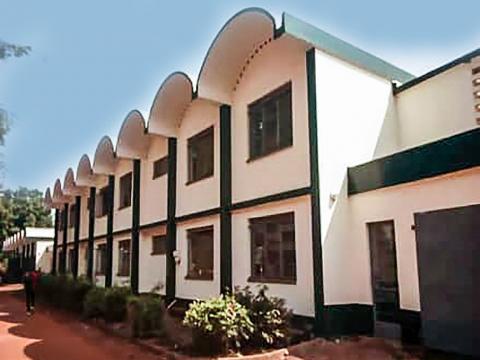By Hajaratu Kalokoh
A report done by the Student Union of Fourah Bay College (FBC) has revealed that the administration cannot afford to pay for meters to be installed on the newly refurbished student hostels, sparking fears of a possible delay in their usage.
The report, which details the state of affairs of the college, is a transition document by the recently installed Student Union executive.
The renovation of the hostels is part of a US$36 million project funded by multiple partners, including the Arab Bank of Economic Development in Africa (BADEA), which has been going on for the last three years.
It is hard to imagine that a project which saw the biggest infrastructural overhaul in the college’s history didn’t take account of electricity meters.
The renovation work was completed since last year, but students have not been able to use the facilities due to the lack of electricity.
“The unavailability of EDSA (Electricity Distribution and Supply Authority) meters in the different hostels rooms is said to be the only major challenge for the reopening of the hostels,” part of the Student Union’s report reads.
It cited the Deputy Registrar of the College saying that EDSA had demanded Le1.2 billion for 800 meters, and that this amount must be paid upfront before delivery.
“The college is financially constrained now to foot that cost, and obviously, students cannot be given the rooms at present,” the report adds.
The college administration has not given any guarantees as to when students will be allowed to occupy the hostels.
Whiles the report quotes the administration saying that they needed 800 meters at the cost of Le 1.2 billion, EDSA said that is not the case.
A spokesman for the Authority told Politico that the college requested for around 828 sets of single-phase (meters) and 11 sets of three-phase meters.
“That is what they requested for. We have raised the bill queue; we have sent it to them, So it’s now left on the side of the university to get back to us as to when they will want us to commence installation,” said Sahr Nepor, Public Relations Officer of EDSA.
According to Mr Nepor, the cost of a single-phase meter is Le705, 500 and the cost of a three-phase meter is Le 1, 355, 000.
By our calculation, the cost of the total number of meters needed for the hostel is Le599, 059,000 (five hundred and ninety nine million and fifty nine thousand leones). This amount is less than half of what the college has projected to spend on the meters.
The Director of Media and International Relations at the University of Sierra Leone did not respond to our request for comment on this and some of the other issues raised in the Student Union report.
The FBC college hostels were shut down since 2011, after its condition worsened.
Sources say one of the main reasons why the college administration is insisting on getting a meter for each and every room is because it accrued a huge debt when the hostels were connected to a central meter system.
Whiles students continue to wait, there is no word yet on how the university intends to raise the money. With the rising cost of transportation and rent in the capital Freetown, students continue to struggle to get to the college’s campus on Mount Aureole every day for lectures.
Other facilities like classrooms, halls, and parking spaces that were either constructed or refurbished under the BADEA project are already in use. Residential facilities housing lecturers have also been in use since last year.
The President of the Student Union, Augustine Bona, said they had engaged the administration on this and had even suggested an innovative way to fund the purchase of the meters.
“We have been in close contact with the administration to see the need to pay the money. In fact we have given them the option to open payment for the hostels. Because obviously students would have to pay a very huge amount, because they all desperately need the hostels,” Bona told Politico.
He added: “after the payment of those monies, they (college) can pay for the light, install them and then relocate students to the hostels. We desperately need the hostels and there is not a better time to give us the hostels than now, especially when transportation is becoming very much unbearable.”
Copyright © 2020 Politico Online









